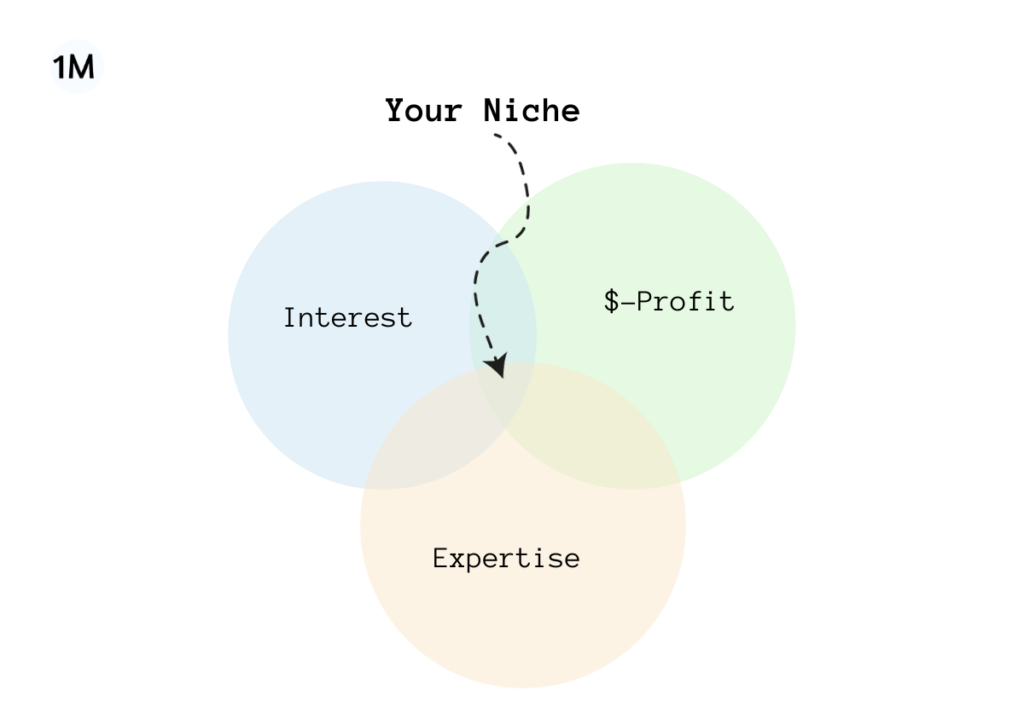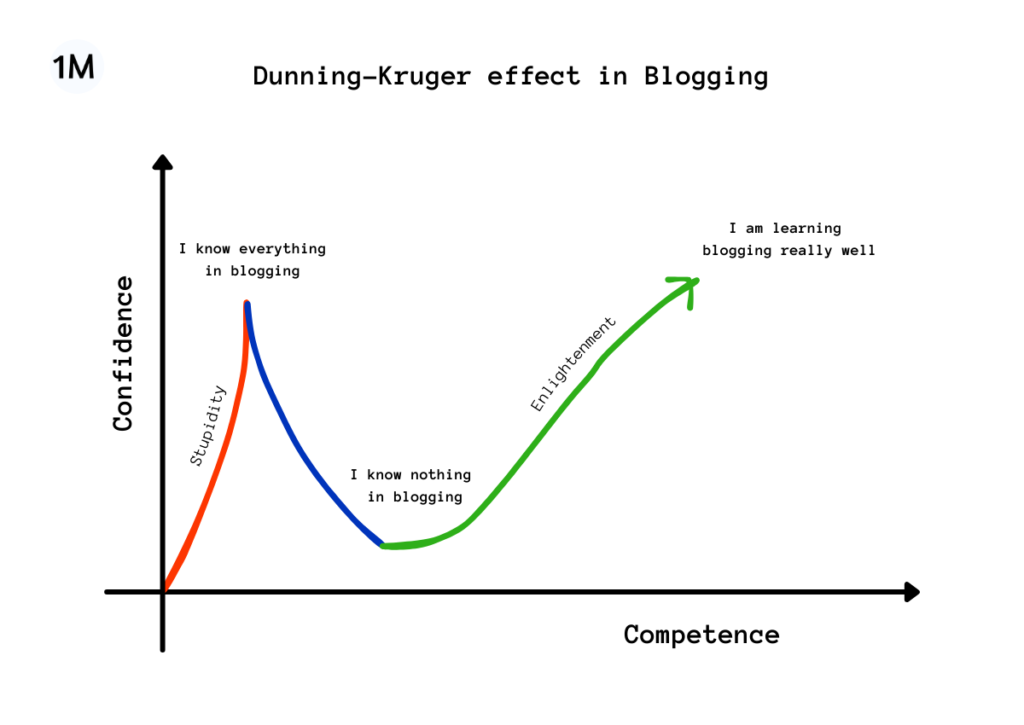A lot of people wish to start a blog, but they are not sure about their niche. Niche selection is the first and most important stage of blogging. Most beginners have a very generalized idea about their niche, but that isn’t worth starting a blog!
For example, one of my blogging students, Jigyasa, wanted to start something in the self-help niche to heal those who are struggling with stress, anxiety, and self-doubt.
Is that enough to start a blog?
Well! No!
Because that’s a very generalized idea. There are thousands of blogs in this category that are already doing great. She won’t be able to compete with them. Plus, that’s a huge topic for her to create content on all alone. A good amount of trimming is required for this generalized idea to get exactly the niche for which she is made.
Finally, she got the 3Ps concept for her blog, which stands for personal healing, personal lifestyle, and personal money, and started this blog, “healwithjigyasa.com.” And that’s so cool and easy for her.
Read this article, and you will find your final niche for your blog as well. For any query, schedule a meeting call with your friendly blogging mentor.
Why Niche Research Is Important?
I am stressing so much on Niche’s selection for a reason. And I can understand your urge to start your blog rather than talk about this boring niche selection stage.
Well! I have no objection if you wish to press the launch button without this pre-planning. You will have to think of these at some point in the future. By then, you might have lost a good amount of time, effort, and money. But if you do this pre-planning with me today, you will realise its importance in the future.
As a blogging mentor, my only objective is to make you enjoy blogging. Once you start enjoying it, you don’t need me much. A roughly picked niche is the #1 barrier to this joy. Whereas, a clear and well-picked niche for your blog is going to be an accelerator for your blogging career.
So, if you are ready, let’s start with question no. 1.
Q1: How interested Are you in this Niche?
This is a very obvious question, so it’s no. 1 on our list.
Your blog needs to be aligned with your interests. A person who hates coding can never run a blog in the coding niche. Very obvious!
Moreover, it’s perfectly fine the other way as well, if you start a blog in a certain niche and are very sure to generate interest in it. No worries about this either.
But how can you be sure about your interest?
How do you confirm it?
Well! It’s time to be your own detective. Track your activities and observe yourself closely. How often do you think or talk in that niche? Does it excites you? Can you bear the hunger for it? Are you following influencers in this niche? Does your friend tease you for it?
During my high school years, I was so interested in astrophysics that most of my discussions with my few closest friends were on topics like the space-time curve, the theory of relativity, string theory, quantum physics, etc. And they used to tease with names like “Satya Physics Mourya” or “Einstein.”
Jokes apart, I am still interested in astrophysics, and soon I will be purchasing my desired “astronomical telescope.”.
Q2: How Well You are in This Niche?
This accounts to your present understanding of the niche. Because if you don’t know it well, you can’t explain it well.
In fact, just knowing is not enough! You have to be either an expert or close to it. Otherwise, your blogging would take longer to succeed.
I started 1MillionBlogs as a blogging mentor, because I know things in blogging. I have been blogging since 3 years and running 5 blogs of my own. Taught 50+ blogging beginners in the past 2 years.
Therefore, I won’t recommend you starting a blog in a niche whose basics are not well built in your mind. If you wish to start a blogging in video editing, you need to have a good hand-on experience in video editing. If its something in sports niche, then you need to have some past or present experience of sports in-field.
If you have never been a parent, blogging about parenting isn’t going to take you long my dear! And, why would your audience trust someone’s tips in parenting who has never been a parent.
Q3: How profitable this Niche is?
There’s a market in every niche; therefore, there is money in every niche. People on Instagram dancing to “Moye Moye” are making money as well.
But somewhere less, somewhere more.
Somewhere easy, somewhere hard.
And, as a blogging mentor, I very well know your choice. You want it where it’s more and where it’s easy. This is why we consider this question important.
There are several ways to make money from blogging.
AdSense is the most popular one. It needs a lot of traffic. That’s why I consider this not for beginners. But we need to setup all this process from the beginning itself. In short, Google AdSense works in every niche if you have a high volume of traffic. But some niches, like finance, crypto, making money online, trading, insurance, etc., have a higher cost-per-click (CPC), while others, like science, people, society, etc., have a lower CPC.
Joining an affiliate programme is the second most popular monetization method, and they are in every niche. So, you need not worry much here as well. But some products are easy to promote, and some are hard to sell. You need to identify at least three such affiliate programmes that you would be joining in that niche. If you get it, you are a green flag in this niche.
Other earning methods, such as sponsored posts, paid guest posts, etc., are also possible as you gain authority in your niche.

A niche that overlaps for all the three areas is the best niche to pick.
Q4: How much your niche is searched on Google?
The majority of traffic on any blogging website (or any website) comes from Google searches. SEO and Google’s ranking are the primary factors in this aspect. Therefore, having a rough idea of this potential can prove to be helpful for future growth.
To understand this better, we will first understand the meaning of search volume and keyword difficulty. And then you are all set to decide your niche with this aspect.
- Search Volume: The number of searches people are making for keywords in your selected niche on Google Search Engine per month is called search volume (on Google).
- Keyword Difficulty: It is the measure of how difficult it is to rank on a certain keyword.
You need to pick a niche with high search volume and low keyword difficulty. You can use the SEMRush tool, Google Keyword Planner, Google Trends, etc. to find out the demand for your niche.
More than the present demand, you also need to identify its future demand. Because starting a blog on outdated products or topics will be a struggle for you. No one reads about Nokia phone reviews anymore. No one reads about how to set up Yahoo! accounts. So, why would you even write about these?
Q5: What Problem You wish to Solve with this topic?
Problems attract people. Anyone landing on your website is mostly looking for some solution to their problem. And it’s your responsibility to understand their problems and provide solutions to them.
So, if you pick a certain niche for blogging, what exact problem(s) are you going to solve with it? If you are not sure, then your audience will never feel connected with you. Plus, you will bounce back from various problems and feel lost.
Identify the primary problem that you are going to solve with your blog. Additionally, list down the secondary problems as well. If possible, also list down the 20 blog post titles and build a monthly content calendar.
Q6. How well have you identified Your Audience of this Niche?
Blogging is a two-way process between you and your audience.
You write, and your audience reads.
Your audience needs information; you deliver it.
And you know very well how to write, but how will you know what to write on? How would you know what your audience needs?
This is why you are required to build a firm understanding of your audience. Their demographics, age group, volume, interest, income level, overall beliefs, etc. You need to build an audience persona.
For example, if you are planning to start a makeup tips blog, you definitely won’t be writing with men or children in mind, nor will you write for those who are financially unable to purchase costly makeup products.
We can call it “audience persona. And, you are required to have a good understanding of your audience persona before starting a blog in a certain niche.
Q7: Have you Identified A Minimum of 3 Competitors of this Niche?
As your blogging mentor, I will not recommend you waste your time and effort re-inventing the wheel. Rather, it’s best to get it from the competitors.
You need to identify a minimum of three competitor blogs in the niche you are planning to start. Look at the problem they are solving. What is their strength and weakness? How can you be better than them? How long would it take for you to catch them in the race?
Be friendly with your competitors. Don’t hesitate to promote them. Don’t envy them; rather, appreciate their work and try to extract their positive points for your blog smartly without copying things straight.
Q8: How this Niche Relates with Your Short-term Goal?
Everyone has some short-term goals. For example, getting a new job, acquiring a new skill, gaining muscles, losing weight, saving a certain amount, learning guitar, upgrading your portfolio, etc. These can be personal or professional.
My question is simple: are your short-term goal and your niche in the same boat?
If YES. It great!
If not, no worries.
Unmatching short-term goals isn’t a big barrier to picking a niche. Because short-term goals change or end within a week or a few months, However, if it matches (or if you could re-align your short-term goal to match it with your niche), it’s going to be really fun for you.
Q9: How long you can Work or Survive In this Niche without Success?
It takes time to reach success in every niche. Forget about success; it will take some time for you to start enjoying blogging in your chosen niche. Once that happens, a few months of consistent work are needed as well, until you start to observe the initial stages of success.
Some beginners lose hope, and some get financially broke. And such bloggers won’t be able to jump off the walls of challenges.
I simply wish to know: do you have enough cushion to bear the jerk on the initial days of struggle? Are you strong enough financially? Can you work without any high hopes of success? Can you just enjoy every day of your blogging instead of living for future success?

Here’s a Dunning-Kruger effect for bloggers. Your journey to becoming a successful blogger will look something like this. Having a mentor can reduce the height of stupidity, but there will still be some fake confidence in you until you realise yourself in a valley of despair.
If you can forget success for 8–12 months, then you are good to go for blogging!
Q10: How this Niche Relates with Your Long term goal?
Just like you have a short-term goal, you must have a long-term goal as well. You might be planning a startup in the future or planning a stock investment. Or you may be planning to start an NGO of your own.
Blogging is very flexible. You don’t need to change your long-term goal. Rather, we will modify your niche in such a way that it ultimately supports your long-term vision.
Bonus: Consult Your Mentor
If you are still confused, consult your mentor.
Well! I am not the only blogging mentor in the market. There are many. Reach out to them and ask them for help—paid or free. You can also discuss this with your friend, who is your well-wisher. Don’t consult any random guy.
Don’t hurry to start. Give yourself a week of time to pick a good niche. Do enough research. And finally, pick something that’s well accepted by your heart and mind.






